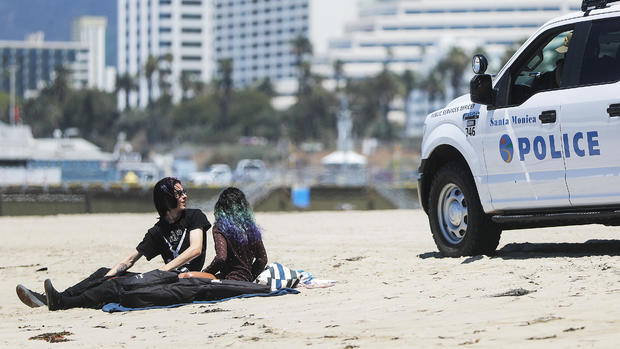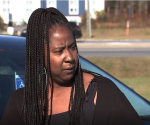36,000 U.S. coronavirus deaths could have been avoided if social distancing began a week earlier, study finds
[ad_1]
About 36,000 coronavirus deaths in the U.S. could have been avoided if social distancing measures were implemented just one week earlier, new data shows. The Columbia University study, released Wednesday, projected there could have been almost 54,000 fewer coronavirus deaths if the measures were taken at the start of March.
Researchers used computer modeling that looked at how diminished contact between people beginning on March 15 — around the time when many states began to enforce social distancing and stay-at-home measures — slowed down the spread of the virus through May 3. Then they applied those findings in simulations beginning one or two weeks earlier, and determined that starting the control measures sooner could have significantly reduced coronavirus cases and deaths.
“During the initial growth of a pandemic, infections increase exponentially. As a consequence, early intervention and fast response are critical for limiting morbidity and mortality,” study said. The research has not yet been peer-reviewed.
As of May 3, over 65,000 people had died of COVID-19 in the U.S. According to the study, if the U.S. had adopted social distancing measures on March 8, nearly 36,000 of those deaths could have been avoided. If the measures had begun on March 1, the study estimated almost 54,000 deaths could have been spared.
Dr. Neeta Ogden, a spokesperson for the American College of Allergy, Asthma and Immunology who was not involved in the research, discussed the study on CBSN.
“These models shows us that one person with an infection very quickly spreads to many and that’s exactly what was happening,” Ogden said. “Even a day, seven days, a week makes such a significant difference in terms of how many people are infected and then certainly how many people die.”
As states continue to reopen their economies and lift lockdowns, the scientists who authored the study say their findings underline the need for a swift response when outbreaks begin to flare up.
“Now that COVID-19 is established as a global pandemic, rapid response remains essential to avoid large-scale resurgences of infections and deaths in locations with reopening plans,” the study said.
The research also highlighted how the New York metro area, the epicenter of the outbreak in the U.S., might have had almost 250,000 fewer cases and 20,000 fewer deaths if the same interventions had been applied two weeks earlier, starting on March 1.
In response to the study, New York Governor Andrew Cuomo said during his daily coronavirus briefing that a ban on travel from China and Europe should been imposed as early as December 31, instead of weeks later — focusing on the federal response rather than the pace of actions taken by the state.
“If this country knew more and knew it earlier, I think we could have saved many, many more lives,” Cuomo said Thursday. “Who knew the virus was already here January, February, March? Now, who should have known? It’s above my pay grade as governor of one state. But what federal agency, what international health organization? I don’t know. It’s not what I do.”
[ad_2]
Source link











